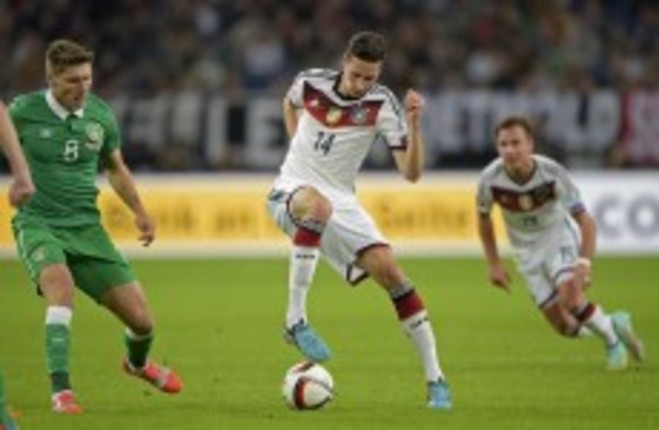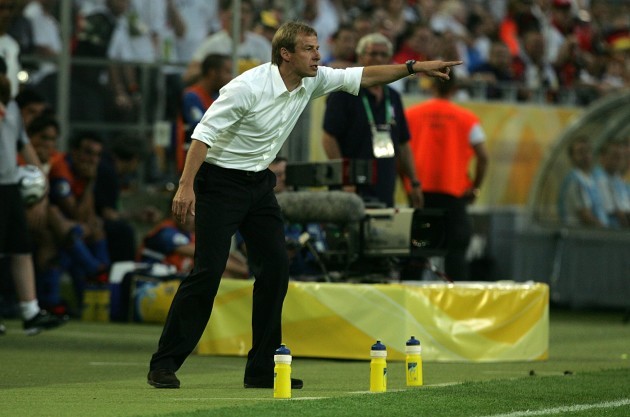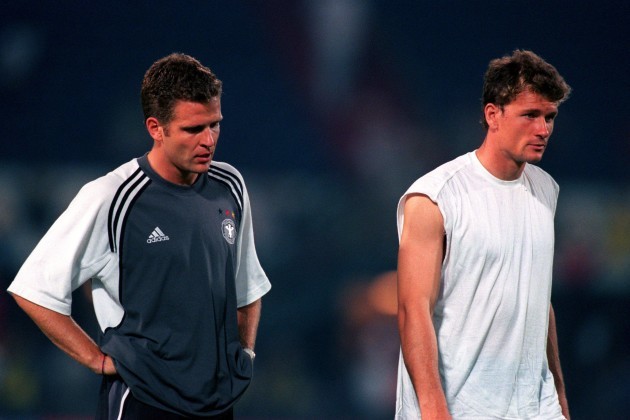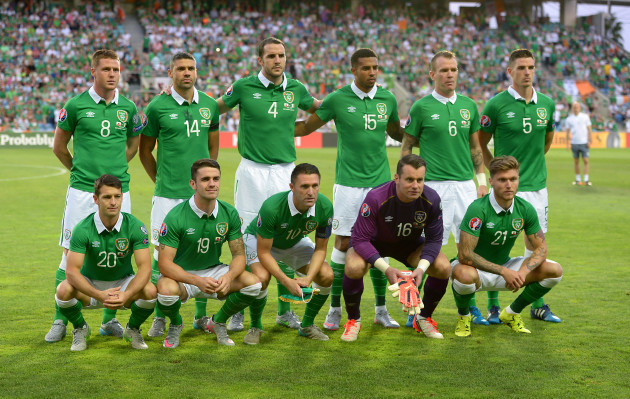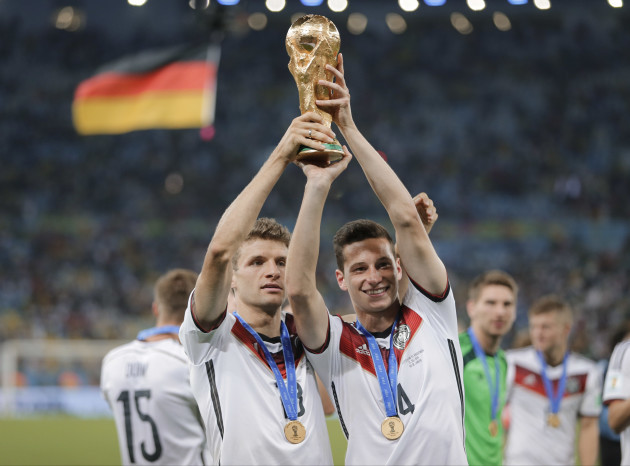FOR A NUMBER of years now, the current dearth of talent in Irish football and the dwindling levels of top players born on these shores has become increasingly apparent, owing largely to a number of disappointing results.
Naturally, people have also been asking why Irish football appears to be in such a bad state for a number of years now.
This week, the issue was particularly relevant, as the findings of the Conroy Report — a study looking in detail at how the League of Ireland can potentially be improved – were revealed.
Strange as it may seem, just over a decade ago, German football was having its own crisis and regular bouts of intense self-reflection. In this instance, however, there was a happy ending — football in the Bundesliga is now arguably healthier than ever, with teams consistently impressing in the Champions League, while the national side were crowned world champions last summer.
But how did Germany get from a point of relative despair to unequivocal success in a relatively short space of time and what can Irish football learn from this significant transformation?
German football expert Raphael Honigstein, who is a columnist for ESPN and the Guardian, has recently published a book which looks comprehensively at the national team’s triumph — it is entitled: Das Reboot: How German Football Reinvented Itself and Conquered the World.
The42 recently spoke to Honigstein about how this revolution of sorts began, who the key people to carry it out were, and what Ireland can take from the success…
First of all, how did you find the process of writing the book?
It was a lot of stuff to juggle and I was running out of time. I was writing weekends and it was relentless and the feeling of going to bed and knowing that the next day, you’d have to write another few pages every single day, it takes a lot out of you. I wouldn’t say it was painful, but it wasn’t fun.
Around the start of the book, German football is at an all-time low. Ottmar Hitzfeld is widely regarded as the best man to take the vacant national team manager’s job but ultimately, he turns down the opportunity and Jürgen Klinsmann gets the job seemingly because no one else wants it. Would it be fair to say Hitzfeld’s decision, while largely seen as disappointing at the time, was a blessing in disguise, given how well everything worked out thereafter?
It probably was. It probably needed someone like Klinsmann to drive through change and make a fresh start. Hitzfeld would probably have been getting the most out of the side but with very different methods — probably playing quite defensive football and trying to make Germany tough to beat again.
They would have been very well organised, but I don’t think we would have had the same kind of euphoria and sense of optimism that came from the team playing the way they did at the World Cup. They didn’t just win, they played football that people enjoyed and felt inspired by.
So I’m not sure it would have been the same with Hitzfeld. He’s not a defensive manager, but he’s very pragmatic. I think he may have looked at the side and thought they’re not ready to play attacking football. They’re going to be exposed. Let’s take the safe route. I’m happy it worked out the way it did.
Joachim Löw is invariably thought of as the mastermind behind this success story story, but would it be fair to say Klinsmann’s role in the overall process has been underestimated?
I think it was underestimated within Germany because [his stint in charge] was relatively short. When Germany kept getting better and better, people forgot about how bad it was and how much pain there was and how much of an upheaval it was when Klinsmann took over.
The moment that Germany met USA at the 2014 World Cup, everyone was writing these stories about Klinsmann and Löw meeting again. People were beginning to realise that all the changes he made and all the innovations he installed have become commonplace. People have forgotten about them because everyone is doing it.
It’s hard to imagine that there was a world without team psychologists, video analysis and modern fitness regimes. I think since the World Cup, people are now a lot more aware of what he’s done certainly in Germany. Internationally, I hope the book will maybe help a little bit on shedding some light on it, because I think people are not quite aware of what an important figure he was.
He jokes about it in the book, but deep down, do you think Klinsmann regrets not sticking around for longer given the number of talented young players that were on the verge of breaking into the international set-up?
I think ‘regret’ would be the wrong word. I think he’s slightly envious of Löw having the players that he has at his disposal right now. At the same time, I think there’s a realisation that he wouldn’t have been able to do what he did — jetting to and from California, having this immense pressure on him to be in Germany.
He really approached it as a two-year project, and put his heart and soul into it. I don’t think the kind of mental energy was sustainable for more than two years.
Somebody like Löw, who lives in Freiburg, and has a relatively quiet life, has a lot of time to go to games. He can just think about the national team the whole time, it makes more sense for him to do it over a long-term period.
I think Klinsmann, in the end, was quite happy to leave on these terms. If he’d gone to the Euros in 2008 and gotten to the final and then lost against Spain the way Germany did under Löw, I’m not sure people would have been that forgiving for him. Whereas it was Löw’s first tournament, so people said: ‘Let’s give him the benefit of the doubt.’ Of course, the second tournament then was a success even though they were knocked out in the semi-final, as the football had become even better.
Was Euro 2000 the key point for German football in terms of people realising that things needed to change and also, apart from Klinsmann, who were the key figures in this transformation of footballing attitude and style?
I think there’s a lot of different levels at which point German football starts to modernise. At the top was Klinsmann, that only happened in 2004. Below that, by 2000, some of the reforms that bear fruit a few years later had just started. It takes a bit of time for them to filter through, so it’s no coincidence that exactly 10 years later, 2010, the first kids who enjoyed this proper footballing education start emerging — Mesut Özil, Jérôme Boateng and Sami Khedira.
I think there was also a tactical element in the Bundesliga where a league that, for a long time, had been very insular and happy with itself and not quite at the cutting edge of football suddenly woke up and said: ‘We have to play differently, we have to play quicker, we have to be more professional, we have to be a lot more innovative. We might not have superstar players, so we need to do more.’
And people like (Jürgen) Klopp set new benchmarks and showed what is possible even with little money — this is why by being smarter, by running more, by being tactically better than your opposition, that then becomes a real impetus and a real eye opener for everybody else, who realise that actually, tactics are important. It’s not just the better players who win games — most of the time, they will win games, but there will be other times where they play against other good players and then the better coached team will win.
These things all came together and of course, in 2014, he reached a point where there is enough quality in terms of the playing pool. There’s enough quality in the coaching that the players come to the national team having been coached by great people at club level. And they’ve got the team spirit right and all the other things that might make a small difference. So it really was a culmination of a long-term project.
What can other countries like Ireland and England take and learn from German football’s reinvention?
You can’t turn back the clock to 2004. A lot of stuff that was new then is now being done by everybody else. You cannot also replicate the German model where you have clubs run by Germans with German fans, with German players, all these things took a long time to get to that point.
What I think is universal, though, is this idea that you shouldn’t get distracted by the noise. By noise, I mean the debates that people like to have in the pub but are not really relevant to what’s really happening. And so, I would say don’t think about things like ‘lack of passion and lack of patriotism’. Don’t suspect that today’s youth are ‘all soft because they don’t play in the streets like we did in the 60s and 70s among the rubble from the Second World War.’
There are all these romantic ideas about what football used to be like and it’s not really like that anymore — or ‘kids playing too much PlayStation to really want to be a footballer.’ All this stuff is totally irrelevant. The only thing that’s relevant is the quality of the coaching that you get as a youngster and the amount of it.
So if you take six million footballers that German football has and throw money at it intelligently, and make sure that the best of these six million are receiving really excellent coaching, coaching that is continually monitored and optimised, the chances are you’re going to produce 20 really good players. So it’s not rocket science really.
For the smaller nations, the Dutch have shown what can be done if your coaching is really good. You can produce 20-30 really good players even if you’re a much smaller country. But it takes money, it takes a football culture, it takes an enormous endeavour.
Germany should have never been that bad really in terms of their resources. Now, they’re only really doing what they should have been doing for a long time — to be at the forefront of European football.
One person who figures prominently in the book is Thomas Müller. Tell us about his character, and also, how highly would you rate him in the pantheon of great footballers?
Thomas Müller is almost incomparable, because he is not the most graceful of players. He doesn’t strike you as someone who has fantastic technique. But he has this uncanny knack of finding space and finding situations where goals will arrive.
A lot of people have compared him to Gerd Müller, who of course was a very different player, but also had this habit of popping up at the right time and scoring.
Thomas Müller’s scoring record for Germany is incredible and without him, they would have not won the 2014 World Cup. Obviously, he became the main striker, even though he wasn’t really a striker going into the tournament. At least, he wasn’t a proper number nine and he still isn’t in a way. But he made it happen and I also think he’s a hugely important figure, because he takes responsibility, never loses his head, and plays with real intelligence.
He once told me that because he’s not so good below the waistline, he has to be really smart above the neck. I think that sums it up — he plays with his head half the time, not with his feet. And I think he also keeps fooling opposition players who think this guy is nothing special. But then suddenly, he’ll score three goals against you.
So he’s an incredible player and a great guy to speak to. He’s really smart, doesn’t take himself too seriously, doesn’t really take football too seriously, and he’s one of the heroes of Germany’s World Cup win.
Finally, one chapter on the book that really struck me was told from the perspective of Thomas Hitzlsperger, who discusses his recollections of being a fringe member of the squad at the 2006 World Cup. What he really hammers home is how significant that tournament was from a cultural perspective for Germany. So I guess it’d be fair to say that the event in itself was a hugely significant part of the overall success story?
That’s right. I think the 2006 World Cup made Germans feel confident about being fans of Germany, in both senses of the word. Being happy to be supporters of the national team which, in the past, wasn’t really that popular or that attractive. You almost felt ashamed a little bit, waving a flag or supporting a German national team too much.
At the same time, it made patriotism normal again — something that’s not threatening, not chauvinistic, not violent, but just good-natured and not (thought of) in a sense where you have to look down on others.
In that sense, it was a hugely important moment for German life after the Second World War and also for German football, because that was the moment when German football started to feel confident with itself again. Because it had been embarrassed by what had happened before and by its own inadequacy when it came to club level and playing in European competitions. So it is a huge moment.
Das Reboot: How German Football Reinvented Itself and Conquered the World is published by Yellow Jersey Press. More info here.
Look out for part 2 of our interview with Raphael on the site tomorrow where he gives his thoughts on the upcoming Ireland-Germany Euro 2016 qualifier.
